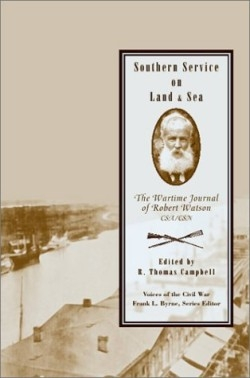
Southern Service on Land & Sea
The Wartime Journal of Robert Watson
On January 1, 1863, Robert Watson wrote in his diary: “New Years day and how different from the last. I was then in excellent health and fine spirits, but now I am in wretched health having been in bed with chills and fever all day. I am absent from my company a paroled prisoner and sick among strangers.” Although Watson was not alone in the extreme suffering he endured to battle Union forces during the Civil War, he was an excellent observer who carefully recorded the triumphs and pitfalls of being a soldier, first for Florida and, later, for the Confederacy.
Like all great diarists, Watson wrote detailed descriptions and included his own feelings about the things that happened to him. The editor has divided Watson’s incredible work into three major sections: his time in the Florida Coast Guard, his duty as a soldier in Tennessee, and his service in the Confederate Navy. Campbell has previously written five books about the Civil War, concentrating on the Confederacy. Here he has provided illustrations and maps to orient the reader, plus appendices including lists of crewmen from Watson’s various companies, two colonel’s reports about the battle of Chickamauga, extensive notes, and a bibliography.
Watson appears to have suffered from pneumonia intermittently from 1862 to 1865. He never recorded being diagnosed with the disease, but for months at a time would describe a debilitating “pain in the breast” accompanied by chills, fever, sleeplessness, fatigue, nausea, and coughing. Army doctors would prescribe quinine to counter the effects of the sickness, but Watson, like many soldiers, suffered from exhaustion, malnutrition, and depression, and endured war without major restorative treatment.
Before he was transferred to the Confederate Navy, Watson served as a soldier in the Army and fought in Tennessee at the battle of Chickamauga. At times, he would write extensive accounts of the skirmishes he participated in, including details about the number of prisoners taken, the time of day when shooting began or ended, and the weather. More importantly, he concluded every entry with a statement of emotion, such as after the battle of Chickamauga, when he described the finished battlefield: “Our troops carrying off the wounded and burying the dead all day. It was a terrible sight, friend and foe lying side by side.” Of course, other days merited lesser entries: “Monday, April 7, Nothing worthy of remark today” or “Tuesday, April 8, Saw a schooner going to the blockade.”
Luckily for history, Watson recorded both the mundane (weather, ration amounts, the status of his own clothing) and the extraordinary (his close friendship with a fellow soldier Alfred B. Lowe, his moments in battle, the few times he interacted with women). Several entries are greatly endearing. On December 7, 1863, following battalion drill in the afternoon, Watson comments on the abilities of a superior officer: “Our Lieutenant Colonel undertook to drill us but made an ass of himself for he knows no more about tactics than my old grandmother.” He reveals both his frailties after a night of drinking on March 17: “Felt very sick all day from the effects of the bad liquor that I drank yesterday and must certainly say that I feel heartily ashamed of myself,” and his opinion of prostitution, as he took his “time in going to the fire which proved to be a house of ill fame that was on fire and it burnt to the ground.”
Although Watson rarely mused on the politics of why he fought for the Confederacy, it is obvious that he was very patriotic and even signed a petition to re-enlist in the army though his term was not yet expired. He recorded the entire petition that he and his fellow soldiers created, including this grandiose paragraph: “Resolved, that the red smoke of battle shall be to us as a pleasant summer sky and the cannon’s booming chorus as sweetest music until the last inch of territory wrested from us by the vandal foe shall be restored and the wronged and outraged South shall be recognized as a peer amongst the nations of the earth.”
After the war, Watson married and continued his life, probably as a carpenter, until his death in 1911. His diary concludes around the same time as the war, with this revealing entry from April 18, 1865: “I forgot to mention that President Lincoln and some of his cabinet were assassinated on Saturday nightÉ Everything is at a standstill at present. Nearly every man here has taken the OathÉ I don’t want to take the Oath, but if they send me to prison I will take it for I am satisfied that the South is gone up the spout and it is of no use for me to linger for a long time in prison for no purpose.”
Reviewed by
Kristin Putchinksi
Disclosure: This article is not an endorsement, but a review. The publisher of this book provided free copies of the book to have their book reviewed by a professional reviewer. No fee was paid by the publisher for this review. Foreword Reviews only recommends books that we love. Foreword Magazine, Inc. is disclosing this in accordance with the Federal Trade Commission’s 16 CFR, Part 255.
